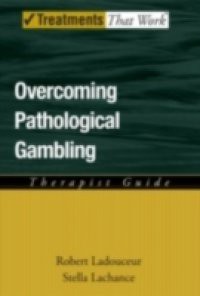As gambling becomes more prevalent and more accessible in our society, pathological gambling is growing as a serious problem. In most instances, excessive gambling negatively affects a persons home, social, and professional life, as well as leads to serious financial trouble. In repeated trials, cognitive-behavioral therapy has proven an extremely effective treatment for this problem. Written by the developers of an empirically supported CBT program for the treatment of pathological gambling, this guide includes all the information and materials necessary to implement successful treatment. Most pathological gamblers exhibit misconceptions or erroneous beliefs about the nature of gambling, believing they can beat the system. One of the central points of focus of this treatment is to help clients correct these beliefs and understand the true nature of games of chance. The authors provide step-by-step instructions for clinicians to help clients understand all of the facets of their problem. In addition to correcting erroneous beliefs about gambling, this program teaches problem solving skills, self-assessment techniques, and trigger recognition and avoidance. Designed to be used in conjunction with the corresponding workbook, this guide provides results not only in supervised therapy, but in long-term relapse prevention as well. TreatmentsThatWorkTM represents the gold standard of behavioral healthcare interventions! DT All programs have been rigorously tested in clinical trials and are backed by years of research DT A prestigious scientific advisory board, led by series Editor-In-Chief David H. Barlow, reviews and evaluates each intervention to ensure that it meets the highest standard of evidence so you can be confident that you are using the most effective treatment available to date DT Our books are reliable and effective and make it easy for you to provide your clients with the best care available DT Our corresponding workbooks contain psychoeducational information, forms and worksheets, and homework assignments to keep clients engaged and motivated DT A companion website (www.oup.com/us/ttw) offers downloadable clinical tools and helpful resources DT Continuing Education (CE) Credits are now available on select titles in collaboration with PsychoEducational Resources, Inc. (PER)

